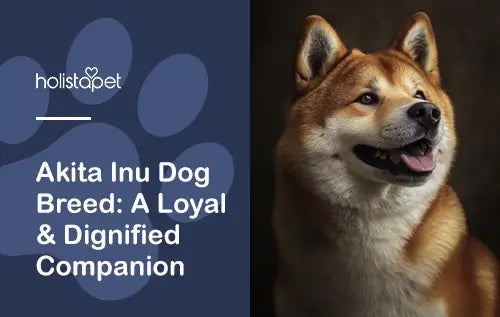The Japanese Akita Inu breed is a true showstopper. It is bold, beautiful, and bursting with personality. Loyal and strong-willed, the Akita breed makes amazing canine companions.
These powerful dogs were originally bred in Japan and have a rich history that adds to their charm. Their fluffy coats, sharp features, and proud stance make them impossible to ignore.
Are you looking for a loyal family member or maybe a dedicated guard dog? The Akita dog delivers every time!
History and Origins of the Akita Inu Dog Breed
The Japanese Akita has a story as bold as its personality. This breed comes from the mountains of northern Japan, where it started as a watchdog and hunting dog.
Akitas were well-loved for their courage and strength. They became trusted companions for both hunters and royalty.
Over the years, the Akita's loyalty and beauty earned it a special place in Japanese culture. Today, it's celebrated worldwide for its rich history that makes it truly one of a kind.
The Akita Inu's Role in Japanese Culture
The Akita dog holds a special place in Japan's heart. These loyal pups are symbols of good fortune, health, and protection. Historically, Japanese royalty treasured this breed and even declared it a "Natural Monument" in 1931.
The breed became even more famous thanks to the story of the Akita named Hachiko. Hachiko waited at Shibuya Train Station every day for his owner, even after his owner's death. To this day, the Akita remains a cultural icon in Japan.

How the Breed Gained Global Popularity
The Akita didn't stay a Japanese secret for long. In the 20th century, this breed's fame spread beyond Japan. The story of Hachiko touched hearts worldwide. Helen Keller even brought the first Akita to the United States in the 1930s.
Groups like the Akita Dog Preservation Society in Japan have worked hard to honor the breed's history. In the United States, the Japanese Akita Club of America, a national breed club recognized by the American Kennel Club, has helped the breed gain even more fans.
Physical Characteristics of the Akita Inu Dog Breed
The Japanese Akita turns heads with its striking looks and powerful build. Whether standing guard or lounging with their family, these pups always look majestic.
Akita dogs are large and sturdy yet carry themselves with grace and dignity. Their thick double coat keeps them warm and adds to their iconic appearance.
Akitas also have a fox-like face with sharp eyes. And their curled tail gives them an extra touch of elegance.
Signature Appearance: Coat, Build, and Size
The Akita breed is muscular and solid, giving it a commanding presence. Their double coat is thick and fluffy, perfect for colder climates.
Standing tall, Akitas have a broad head, triangular ears, and a tail that curls over their back like a fluffy ribbon. Males are larger and more robust, while females tend to be slightly smaller but just as striking.
Akita Inu Colors and Markings
The Akita Inu comes in a variety of stunning colors. You'll find these dogs in shades like red, white, brindle, and sesame. They also often have white markings on their chest, face, or legs.
Their coat type has a soft underlayer and a coarse outer layer. One of their signature traits is their "urajiro" markings. This refers to the lighter cream or white shade on the underside of their body.
Temperament and Personality of Akita Inus
Akita owners know all too well the lovable personality of the Japanese Akita. These pups are loyal, intelligent, and strong-willed.
While they can be independent thinkers, they can still form deep bonds with their family members. Akitas are natural protectors and work hard to guard their loved ones.
With proper training, they can balance their dignified nature with a loving and playful side. The Akita is the perfect mix of strength and heart.
Loyal and Protective Nature
The Japanese Akita is fiercely loyal, always keeping an eye out for its loved ones. They are natural guardians, ready to step in if they sense a threat.
But they're also incredibly gentle with their family. Once an Akita bonds with you, it's a connection for life! They're devoted, dependable, and always ready to stand by your side.
Intelligence and Independence
The Akita is smart and knows it! This breed picks up new commands and routines quickly.
However, the Akita's independent nature means they like to do things their way. They think for themselves, which makes them both impressive and challenging to train.
While Akita dogs can be a bit stubborn, your patience and consistent dog training can go a long way. The breed's mix of brains and boldness makes them a unique and rewarding companion for confident owners.
Similar Breeds
If you're wondering what breeds are similar to this Japanese icon, we have rounded up the top contestants. Here are the most relatable dogs based on appearance, personality, and origin:
- Shiba Inu
- Kishu Ken
- Tosa Inu
- Hokkaido Dog
- Kai Ken
- Alaskan Malamute
- Siberian Husky
- Samoyed
- Chow Chow
- Tibetan Mastiff
Do Akita Inus Have Any Common Health Concerns?
Like any breed, the Japanese Akita has a few health concerns to watch for. These dogs are generally sturdy, but some can face issues like hip dysplasia or autoimmune conditions.
Regular vet checkups and a healthy lifestyle can help keep them feeling their best. Proper nutrition, exercise, and joint support supplements should be part of their wellness routine. With the right care, Akitas can thrive and enjoy a long, happy life.
Hip Dysplasia and Joint Issues
Hip dysplasia is a common concern for large breeds like the Akita. This condition can cause joint discomfort and affect their mobility over time. With regular exercise, a balanced diet, and joint supplements, Akitas can maintain strong and healthy joints.
To help, HolistaPet offers top-notch mobility supplements for our canine friends. We have Joint-Supporting Soft Chews and soothing CBD-infused mobility Treats (in chewy and crunchy variants). These goodies are a great addition to your Akita's daily routine.
Autoimmune Disorders in Akitas
Akitas can sometimes experience autoimmune problems, which happen when the immune system doesn't function as it should. These conditions can impact their skin, coat, or overall health.
To support their immune health, give your Akita only high-quality food. You can also try supplements for added support, like our bestselling Immune Support Soft Chews.
Regular vet visits are also key to catching any issues early. With a proactive approach, you can help your pup stay tough and vibrant all day, every day.
Eye Conditions Like Progressive Retinal Atrophy
Some Akitas may suffer from Progressive Retinal Atrophy (PRA). PRA is a degenerative condition that can affect their vision over time.
Regular eye checkups with your veterinarian can help detect this problem early. A diet rich in nutrients that support eye health can also make a big difference. Pay attention and keep your Akita's vision sharp with the right care.
Grooming Needs for the Akita Inu Dog Breed
The Japanese Akita's thick double coat needs extra care to keep it looking its best. Regular grooming helps maintain coat health and keep shedding under control.
These dogs are naturally clean, yes, but their dense fur needs upkeep nonetheless. Brush their fur regularly to prevent tangles and matting.
Seasonal shedding can be intense. So, having the right grooming tools on hand is super important. Stick with a consistent routine, and your Akita will stay clean and stunning.
Maintaining Their Thick Double Coat
The Japanese Akita's double-layered coat is one of their most iconic features. It consists of a soft undercoat and a coarser outer layer. These layers work together to keep them warm and protected.
Weekly brushing is a must to remove loose fur and prevent tangles. During shedding seasons, daily brushing can help manage the extra fluff. A quality brush or grooming rake works wonders for keeping their coat smooth and shiny.
Managing Shedding and Seasonal Fur Maintenance
Akita dogs are heavy shedders, especially during seasonal coat changes. Twice a year, they blow their coat. This means you'll see a lot of fur flying around!
During these times, daily brushing helps keep shedding under control. A de-shedding tool or grooming rake is perfect for tackling their thick undercoat.
And don't forget regular baths during shedding season. They can help loosen old fur. With the right tools and routine, managing your Akita's shedding can be a breeze.
Exercise and Training for Akita Inus
The Akita is an active and intelligent breed. Owners see it thrive with regular exercise and consistent training.
These energetic dogs need daily physical activity to stay fit and happy. It can be a long walk, a game of fetch, or some playtime in the yard.
The Japanese Akita's strong-willed nature also means training should start early and be consistent. A mix of mental stimulation and physical activity helps keep them balanced.

How Much Exercise Does an Akita Inu Require?
A daily routine of 30 to 60 minutes of activity is ideal for Akitas. Long walks, hikes, or interactive play sessions are great ways to keep them engaged. They also enjoy tasks that challenge their minds. Think puzzle toys or obedience drills.
While they love being active, these pups also appreciate downtime with their family. A good mix of exercise and relaxation keeps them in top shape.
Tips for Training a Strong-Willed Breed
Training a Japanese Akita takes patience and consistency. Their independent nature can make them a bit stubborn. But we've got some tips to help:
- Start Early. Begin training as a puppy to establish good habits and build trust.
- Use Positive Reinforcement. Reward with treats, praise, or playtime to encourage good behavior.
- Be Consistent. Stick to the same commands and rules to avoid confusion.
- Stay Patient. Akitas are smart but need time to adjust to new lessons.
- Socialize Regularly. Introduce them to people and other dogs early to build confidence.
Nutrition for a Healthy Akita Inu
The Akita requires a balanced diet that meets its specific nutritional needs. High-quality dog food with the right mix of protein, healthy fats, and essential nutrients? That's what we're talking about!
Portion control is also important, as Akitas are prone to weight gain if overfed. Remember not to feed them table scraps. Also, make sure they always have fresh water. Remember, A happy Akita starts with a healthy meal plan.
Dietary Requirements for Akita Inus
The Japanese Akita benefits from a high-protein diet to support its muscular build and active lifestyle. Choose dog food with real meat as the main ingredient. Stay away from fillers like corn or soy.
Healthy fats like omega-3 and omega-6 are also helpful for your pup's coat and overall health. Add in a mix of vitamins and minerals, and your Akita gets support for strong bones and a robust immune system.
Fun fact: At HolistaPet, we offer Multivitamin Soft Chews for Dogs. This daily treat brings essential nutrients and more to support your canine bestie's overall wellness.
Foods To Avoid for This Breed
Some foods can be harmful to your Akita. Here's a quick list of what to keep out of their diet:
- Chocolate. Contains theobromine, which is toxic to dogs.
- Grapes and Raisins. These can cause kidney damage in dogs.
- Onions and Garlic. Harmful to their red blood cells and can lead to anemia.
- Avocado. Contains persin, which is toxic to dogs.
- Fatty Foods. These can upset their stomach and lead to long-term health issues.
Are Akita Inus Good Family Dogs?
The Japanese Akita can make a wonderful addition to the right family. Loyal and protective, they make excellent guardians for their loved ones.
Although they may act reserved around strangers, Akitas form strong bonds with their humans and are gentle with those they trust. With early socialization and consistent training, they can smoothly adapt to family life.
Akitas and Children: What You Need To Know
When properly trained and socialized, Akitas can be great with children. Akitas are naturally protective and often see younger owners as part of their pack.
Supervised interactions are important, especially with small children. This can make sure everyone stays safe and happy.
Also, teach kids how to respect the dog's space. Show them how to handle their canine friends gently so they can build trust. With the right approach, Akitas pups can become loyal and watchful companions for little ones.
Compatibility With Other Pets
The Akita's strong-willed nature means they may not always get along with other pets, especially those of the same sex. They tend to do best in homes where they are the only dog. However, if introduced properly, they can learn to coexist with other animals.
Early socialization helps them learn how to interact positively with other pets. It's important to supervise their interactions and provide consistent training. With patience and effort, Akitas can learn to share their space peacefully.
Frequently Asked Questions About the Akita Inu Dog Breed
The Japanese Akita raises a lot of curiosity with its bold looks and unique personality. People often wonder about their lifespan, suitability for new owners, and care needs. These loyal companions are full of surprises and have much to offer the right household. Let's tackle a couple of the most common questions to help you understand this remarkable breed even better.
How Long Do Akita Inus Typically Live?
With proper care, the Akita typically lives between 10 and 15 years. A healthy diet, regular exercise, and routine vet visits can help them reach the higher end of this range. Genetics and lifestyle also play a role in their life expectancy.
Keeping your Akita at a healthy weight and providing joint support as they age can make a big difference. With love and attention, your canine companion can enjoy a long and fulfilling life by your side.
Are Akitas Suitable for First-Time Dog Owners?
Japanese Akitas can be challenging for first-time dog owners because of their strong-willed and independent nature. Akitas need confident leadership, consistent training, and plenty of socialization from an early age.
While Akitas are loyal and loving, their size and stubborn streak can be overwhelming for inexperienced owners. But with patience and commitment, even first-timers can succeed with an Akita. If you're up for the challenge, the bond you'll build with an Akita is truly unforgettable.
Final Thoughts on Akita Inus
The Japanese Akita is a one-of-a-kind breed, combining loyalty, intelligence, and a dignified personality. They thrive in homes that understand their unique needs. Most of all, they shine with owners who are willing to invest time in their training and care. (Pro tip: To help keep your Akita healthy and happy, turn to HolistaPet's premium wellness products.)
From their rich history to their striking looks, Akitas have so much to offer to the right family. Undoubtedly, owning one is a rewarding experience you won't ever forget.







![Probiotics For Dogs [Soft Chews] - HolistaPet](http://www.holistapet.com/cdn/shop/files/Probiotic-Infographic-1_472d7a29-e30c-435a-9638-1365d8c3a9f9.jpg?v=1725384841&width=104)




























Leave a comment
All comments are moderated before being published.
This site is protected by hCaptcha and the hCaptcha Privacy Policy and Terms of Service apply.